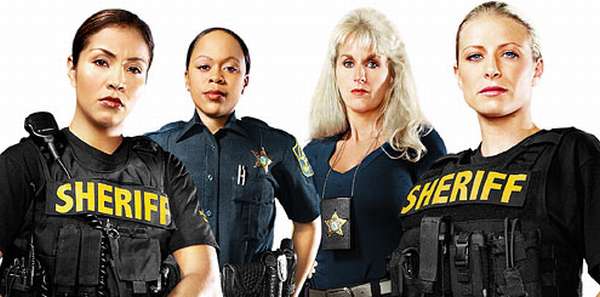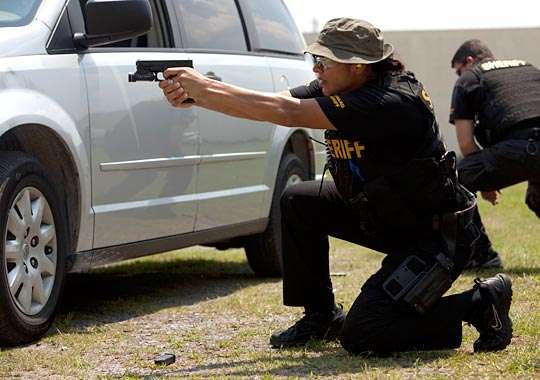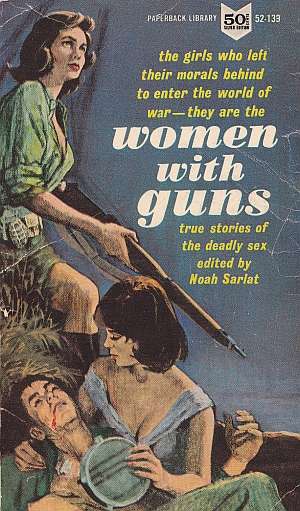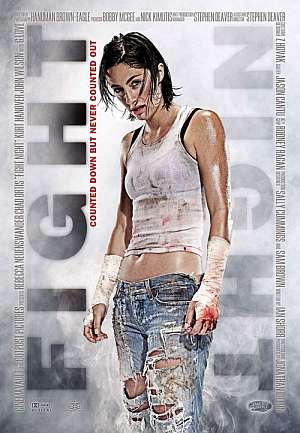“In an old apartment building on the wrong side of the tracks, two women, unknown to each other, live across the hall on the second floor. Galia (Olga Kurylenko of Quantum of Solace and Neil Marshall’s upcoming Centurion) is an assassin involved against her will with the local sex-traffic mafia. All she wants is to reunite with her daughter that she left back home in Ukraine. Elinor (Ninet Tayeb) is a grocery store cashier and a battered wife. She dreams of winning the lottery and running away from her abusive husband. Galia and Elinor don’t know each other, but as neighbors they share two things: an adjoining wall and a strong need to plan their escape. After Galia disobeys her latest contract and Elinor discovers that she’s pregnant, the two women decide to take action against their oppressors in a fight for survival and freedom.” I particularly like the line, “You hold gun like little girl. Hold gun like woman.”
Month: October 2009
Police Women of Broward County
 ★★★½
★★★½
“Mums with guns.”
 Twenty years ago, Cops debuted on Fox, and has become a part of the cultural landscape, leading to an avalanche of spin-offs, ranging from the serious to the complete spoofs (Reno 911 being the most notable). The very first episode took place in Broward County, Florida and, two decades later, the latest in the field returns there. PoBC, as I’m going to refer to it for obvious reasons, follows four women members of the Sheriff’s Department there, both at home and on duty, as they take down the bad guys and deal with the public.
Twenty years ago, Cops debuted on Fox, and has become a part of the cultural landscape, leading to an avalanche of spin-offs, ranging from the serious to the complete spoofs (Reno 911 being the most notable). The very first episode took place in Broward County, Florida and, two decades later, the latest in the field returns there. PoBC, as I’m going to refer to it for obvious reasons, follows four women members of the Sheriff’s Department there, both at home and on duty, as they take down the bad guys and deal with the public.
The four present a cross-section, covering three races and a broad range of ages, from 25-year old Deputy Shelunda Cooper, to Detective Julie Bower – almost double Cooper’s age, whose hair appears firmly rooted in the 1980’s. Each episode is a semi-random selection of incidents. If there’s a theme, it’s in the type of crimes with which each deals. Bower is a member of the sex-crimes unit, which covers everything from rape cases to staging prostitution stings [one of which involved her dressing up as a street hooker]. All the cases of Detective Ana Murillo seems to involve drugs, while Cooper is the queen of the “domestic” – if there’s a family squabble, she’ll be there. Detective Andrea Penoyer’s caseload has a little more variety, though she achieved a certain notoriety for her gung-ho quote, “There’s always a good time to use a Taser,” featured prominently in the trailer (below).
Murillo seems to have a little bit of an attitude, shall we say, especially if any of the members of the public with whom she comes into contact do not adopt the appropriate reverential approach – such as the woman who has the temerity to talk on her cellphone. Murillo basically confiscates the phone, and there are numerous other incidents in the show which have a questionable nature as far as constitutional rights go. Her approach to law-enforcement appears to have more in common with Judge Dredd than “To protect and serve,” though one wonders whether TLC’s description of it as a docudrama – emphasis added – has more significance than might immediately be obvious.
“I’m no different fron the guys, I still kick ass and take names – I just do it with nail-polish and lip-gloss.”
— Ana Murillo
 Despite Murillo’s unquestioned position as Empress of Lip-gloss, it’s blonde, blue-eyed Penoyer who is the glamour queen of the show – though the illusion is somewhat damaged when she starts yelling commands at suspects in a voice that’s probably the audio equivalent of getting Tazered. Though as she points out, such an attitude is necessary: “When someone walks in a room and you got a cop who is 6’5″ and 300 pounds, he looks intimidating. So we have to act intimidating: we have to be very, very serious and let people know we’re not playing around.” Well, not all the time, anyway. We also get to see Penoyer and her policewomen friends shopping for guns, and relaxing on the beach. In their bikinis.
Despite Murillo’s unquestioned position as Empress of Lip-gloss, it’s blonde, blue-eyed Penoyer who is the glamour queen of the show – though the illusion is somewhat damaged when she starts yelling commands at suspects in a voice that’s probably the audio equivalent of getting Tazered. Though as she points out, such an attitude is necessary: “When someone walks in a room and you got a cop who is 6’5″ and 300 pounds, he looks intimidating. So we have to act intimidating: we have to be very, very serious and let people know we’re not playing around.” Well, not all the time, anyway. We also get to see Penoyer and her policewomen friends shopping for guns, and relaxing on the beach. In their bikinis.
This illustrates the strange double-standard at the heart of the show: on the one hand, it wants to show that the subjects are “just like the guys”. On the other, it keeps reminding us that three of the women are mothers – two of them single moms – and takes great care to point out how much they care about their kids. That’s the dichotomy that’s at the core of girls with guns: the contrast between the maternal and life-giving aspects and the death-dealer. I suspect, however, that it would be giving the creators of the show more credit than they deserve if I were to say they were conscious of such philosophical concepts.
Oddly, it’s Cooper of whom we grew fondest, even though she seemed condemned to the pettiest of crimes – someone refusing to pay a taxi fare for instance. Yet she seemed the one most genuinely concerned with her role as a member of the community, not just as a law enforcer. In one scene, she was called to an elderly gentleman’s apartment and ended up calling his girlfriend on his behalf; in another, she gave a homeless person the sandwich her husband had bought for her dinner. When she got a ‘proper’ crime – a burglary – and was able to take fingerprints, she was so genuinely delighted, we couldn’t help but cheer – hopefully, she’ll eventually achieve her ambition of getting into the CSI side of things.
I do have some serious qualms about the philosophy of policing shown here. While there’s no denying the awful effects of drug addiction [some of those arrested are a stark, poignant reminder of that], the efforts here seem almost entirely directed at street-level pushers – who, curiously, all seem to be black. What are the odds of that? Busting them is a pointless endeavour, since it simply creates a temporary gap in the marketplace, into which someone else will stop. Even more dubious are the prostitution stings: disturbing amounts of police resources are devoted to something which is basically a massive waste of time. Want to control prostitution? Legalize it, license it and tax it.
Once again, however, the creators have little no interest in addressing such things. This is about the telegenic end of policing, where no bad guy gets away and questions about rights and the ethics of entrapment operations are not considered. It’s entertainment, pure and simple – and even as people who have a very low tolerance for “reality entertainment” [since we usually find it neither realistic nor entertaining], this is curiously habit-forming.
Shown: TLC, Thursdays, 9pm
Star: Ana Murillo, Shelunda Cooper, Julie Bower, Andrea Penoyer
Women With Guns, by Noah Sarlat
★★½
“Doesn’t live up to the blurb on the back. Then again, how could it?”
 The tender sex – and the terrible things they can do. Violence, savagery, sudden death on the battle field, torture and butchery behind enemy lines – these are the facts of war. It is a man’s world… but what of the women trapped in it? What of women such as:
The tender sex – and the terrible things they can do. Violence, savagery, sudden death on the battle field, torture and butchery behind enemy lines – these are the facts of war. It is a man’s world… but what of the women trapped in it? What of women such as:
- Minerva, the sexton’s sexy daughter, who loaned her secret weapon to the Danish underground…
- Repon Sirik, young leader of Indochina’s feared Hoa Hoa, women warriors who’ve made life a living hell for their enemies…
- Tuli, the Laotian lady with a yen for vengeance and a wild way with jungle warfare…
- Frau Kastanie, the not-so-merry widow and her party-girl panzers of Bremen…
- Katina, her four Greek girl friends, and their crazy, blood-spattered flight to Istanbul…
These are the women with guns, stripped of morals, fighting and loving in the savagery of war. You’ll meet them (and others) in these strange but true accounts.
That’s the lurid copy on the back of this fifty-cent 1962 pulp collection of stories, originally published in magazines with names like For Men Only or Male. The reality is rather different: without exception, the characters mentioned are supporting at best, and nearer cameos in a couple of cases. The stories are very much male-oriented: for example, the head of the Danish underground, and the man who leads Katina et al out of Nazi territory. It’s through their eyes that events unfold, and they’re responsible for most of the action. There are occasional moments otherwise – but in that area, I note it’s the “foreign” i.e. non-white women, who are easily the most pro-active. Civilized girls just don’t do that sort of thing.
This doesn’t mean that the stories are bad: the majority are solid, two-fisted pieces of entertainment, obviously products of their era (sex is fairly frequent, yet largely happens off-page, after a knowing ellipsis), yet rarely dull. The sole exception is Hitler’s Hustlers of Bremen, a muddled, confusing and, frankly, dull piece about black-market shenanigans in Germany just after the war. My favorite, on the other hand, was Five Greek Girls to Istanbul – basically, the title is close to the plot there, with the hero leading his mini-harem through occupied territory, with a sojourn as members of the resistance on the way. Still, I can’t hide a sense of disappointment, even if such mis-direction is a concept with which I’m certainly familiar: many are the 21st century DVDs with equally lurid cover and blurb, that similarly fail to deliver.
Editor: Noah Sarlat
Written by: Richard Gallagher, Emile C. Schurmache, George Mandel, James Collier, Burton Shean
Fight Night
★★★½
“You’ve got the balls, you’ve got the skills, and unlike most female boxers, you don’t look like an ugly man-hater.”
 Michael Dublin (Ortis) is a wheeler-dealer, swinging between fixing underground fights and selling dodgy auto parts as need and opportunity arises. When the latter goes wrong, causing the car to explode rather than go faster, he is rescued from a beating by Katherine Parker (Neuenswander), a girl who easily disposes of the attackers, giving Dublin an idea. Instead of rigging the bets by getting good fighters to take a dive, what about winning with someone like Kat, who can win straight-up, but on whom no sane gambler would ever wager? Initially, things go as planned, despite her qualms about being labelled “Kid Vixen”. But Dublin’s reputation precedes him, and he is requested by Richter (Hanover), who runs the underground ring, for his fighter to lose a bout. Ok, “requested” might be the wrong word there. However, Kat is having none of it, leaving her manager with a very difficult choice to make, and choices have consequences.
Michael Dublin (Ortis) is a wheeler-dealer, swinging between fixing underground fights and selling dodgy auto parts as need and opportunity arises. When the latter goes wrong, causing the car to explode rather than go faster, he is rescued from a beating by Katherine Parker (Neuenswander), a girl who easily disposes of the attackers, giving Dublin an idea. Instead of rigging the bets by getting good fighters to take a dive, what about winning with someone like Kat, who can win straight-up, but on whom no sane gambler would ever wager? Initially, things go as planned, despite her qualms about being labelled “Kid Vixen”. But Dublin’s reputation precedes him, and he is requested by Richter (Hanover), who runs the underground ring, for his fighter to lose a bout. Ok, “requested” might be the wrong word there. However, Kat is having none of it, leaving her manager with a very difficult choice to make, and choices have consequences.
The problem is the script, which doesn’t so much avoid the usual boxing cliches as play join-the-dots with them. Both Dublin and Parker have murky pasts and honest ambitions. There’s a steady climb up through opponents until the “boss-level” one against Richter at the end. He beat Kat to a pulp early in her career, yet still resorts to any manner of nefarious schemes to make sure he wins – even threatening Dublin’s life should Kat not go down. And the ending poses a greater danger to the audience’s teeth than anything. That said, I’ve seen worse. Much worse. Here, the other elements of the movie definitely help paper over the cracks in the story, though you need some suspension of disbelief that Parker inevitably KO’s opponents twice her size.
Not beat them, however, since Neuschwander is quick and powerful, her background in taekwondo (where she was a world sparring champion in 2000) clearly apparent, lending the fight scenes a legitimacy perhaps missing from, say, Million Dollar Baby. Acting-wise, she’s surprisingly impressive, given this appears to have been her film debut; she and Ortis have an interestingly-spiky relationship, with their verbal sparring almost as intense as the in-ring bouts. [Credit to the make-up artist, incidentally, for a vivid depiction of the damage Kat takes, which is so nasty as occasionally to be distracting] All told, the strengths outweigh the weaknesses, the performances and direction giving this one a victory on points.
Dir: Jonathan Dillon
Star: Chad Ortis, Rebecca Neuenswander, Kurt Hanover, John Wilson
a.k.a. Rigged




